Twelve high-level panels and numerous online workshops provided insights into the key themes of EU-Africa business, trade and investment relations. Below are the sessions related to agriculture and food systems.
The full agenda with the recordings is available here (if you register)
14/02 Building blocks of a resilient agri-food system and value chains in Africa, and possible collaborative arrangements between public and private sector in the light of the COVID 19 experience
Organised by the AUD-NEPAD and FEWACCI
- Moderator: Dr Godfrey Bahiigwa, Director Agriculture and Rural Development AUC
- Nana from Ghana
- Ms. Providence Mavubi
- Ousmane Badiane
- Martin Bwalya
- Raymond ADJARPA ABILE, Secretary General, Chambre de Commerce et d'Industrie du Benin
14/02 Investing in resilience: The future of regenerative agriculture in Africa
Organised by Footprints Africa. The objective was to hold a session that outlines the pathway to scaled-up investments in African regenerative agriculture: how investors can get better-positioned and how governments can work differently to accelerate the shift. Regenerative agriculture is a huge business opportunity for Africa. Estimates suggest that $1 invested in land restoration can create $7 to $30 in economic benefits, while protecting biodiversity and fighting climate change. It also makes sense as a risk mitigation strategy; approximately half of the world’s total GDP - some $44 trillion - is dependent on ecosystem services.
Regenerative agriculture at its core is about working with – and not fighting against – nature, more specifically to work in a way that soil can renew itself. We shouldn’t underestimate the implications of this. It requires changing food systems, and by extension, business models. What does this mean for businesses? Globally, companies with significant value chains on the continent such as Cargill, Danone, Nestlé, Olam, Pepsi, Unilever, and Walmart have all made ambitious public commitments toward regenerative agriculture in their value chains. How far will those commitments reach?
This session brought leaders in regenerative agriculture value chains and shared insights from
Footprints Africa's work to map the circular economy in food systems on the continent. It drew on selected extracts from Footprints Africa’s recent report on regenerative agriculture during the session
Footprints (2021) Roots of the FutureThe businesses regeneratingAfrica’s soils #34 p.
Regenerative agriculture at its core is about working with – and not fighting against – nature, more specifically to work in a way that soil can renew itself. We shouldn’t underestimate the implications of this. It requires changing food systems, and by extension, business models. What does this mean for businesses? Globally, companies with significant value chains on the continent such as Cargill, Danone, Nestlé, Olam, Pepsi, Unilever, and Walmart have all made ambitious public commitments toward regenerative agriculture in their value chains. How far will those commitments reach?
This session brought leaders in regenerative agriculture value chains and shared insights from
Footprints Africa's work to map the circular economy in food systems on the continent. It drew on selected extracts from Footprints Africa’s recent report on regenerative agriculture during the session
Footprints (2021) Roots of the FutureThe businesses regeneratingAfrica’s soils #34 p.
At the heart
of regenerative agriculture is a recognition that
mobilising the complexity of natural systems is more
important than adopting a tech-driven approach.
But, critically, new technologies have
the potential to increase the power of smallholder
farmers. Technology will also have a fundamental role
in making the job of regenerative farming less labour intensive and more profitable, which are two of the
major drivers of Africa’s inter-generational decline in
farmers.
Organised by MEDEF International + UPAS (union of G5 Sahel business federations)- Joanna Bingham, CEO, Footprints Africa (chair)
- Christopher Zaw, Partner, Warc group, Sierra Leone, christopher.zaw@warcgroup.com
- Kofi Debra, CEO, OKO Forests, Ghana, kofi@okoforests.com
- Joseph Lentunyoi, Director, Laikipia Permaculture Centre, info@lpct.or.ke
14/02 Agri-food systems in the Sahel: the need for investment in local value chains
The development of the economy represents a response to the multiple crises experienced by the countries of the Sahel. However, in the Sahel, the food economy represents 27% of GDP and 80% of total employment. Agriculture remains the main segment. The agricultural sector is dominated by subsistence production systems, characterized by small farms, with low productivity, high levels of self consumption, and weak integration of value chains. Because of their capacity for innovation and investment, private operators are seen as key players in the transformation of African agriculture, which must simultaneously increase agricultural production, provide healthy and nutritious food to a rapidly growing population, sustainably preserve natural resources, and provide jobs and decent incomes to tens of millions of young people entering the labor market each year.
Partnerships between companies and producers are put forward as a model for structuring sectors to integrate small producers more equitably and sustainably. Thus, dynamic agro-food processing SMEs are developing in various sub-sectors. Nevertheless, the potential for production and agro-food processing is still under-exploited. The objectives of this sessions were:
- Highlight the challenges of developing agri-food chains in the Sahel
- Underline the obstacles to the development of agri-food in the Sahel
- Highlight the role of the private sector and promote co-investment models for sustainable place-based agri-food systems in the Sahel
- Feed reflections on good support practices for private operators involved in the agri-food sectors in the Sahel
Speakers
- Moderator Mr. Henri de VILLENEUVE, President COBASA
- Mr. Franck VIAULT, Head of Sector Sahel, DG INTPA
- Mrs. Zeinabou MAIDAH, CEO Niger-lait and President Organisation Professionnelle des Industriels du Niger (OPIN)
- Mrs. Sophie MÉNAGER, Managing Director I&P Accélération au Sahel
- Mr. Bastien BALLOUHEY, CEO Grands Moulins de Mauritanie
14/02 Investing in the Next Generation of Farmers for Resilient and Sustainable Agri-Food Systems
Organised by CropLife Africa Middle EastObjectives: Enhance the EU Africa Dialogue on youth entry and sustenance into Agriculture as a career and business option backed by a facilitative business and investment environment. Create incentives for PPPs in agrifood systems that benefit both continents
- Dr. Agnes Kalibata - Alliance for a Green Revolution in Africa (AGRA)
- Jerome Barbaron, President CropLife Africa Middle East - CropLife Africa Middle East
- Dr Bart de Steenhuijsen Piters, Senior Scientist Food Systems - Wageningen Economic Research
- Denis Kabiito. World Farmers Organisation Youth Committee Chair
- Moderator: Denene Erasmus Business Day
15/02 Circular Food Systems in Africa – opportunities and challenges for EU / African Cooperation
Organised by African Circular Economy NetworkObjectives: To present and discuss the role of the circular economy in creating resilient, regenerative and climate-positive solutions in African food value chains from the farm to consumer. The opportunities and challenges for developing circular African food systems will be presented and discussed, particularly in the context of EU / Africa cooperation. African case studies were presented as a panel with reflections from a European perspective.
- Moderator Jocelyne Landry Tsonang, African Circular Economy Network / ACEN Foundation, Cameroon
- Piotr Barczak, European Environmental Bureau, Belgium
- Ndidi Okonkwo Nwuneli, Global Alliance for Improved Nutrition (GAIN), Nigeria
- Himkaar Singh, The Compost Kitchen, South Africa
- Alyssa Jooste, ABInBev, South Africa
- Elke Nijman, African Leadership University / Circular Africa / African Circular Economy Network, Rwanda
- Noël N'guessan, LONO Côte d’Ivoire
15/02 L'Agritech : Voie Royale pour des Investissements Rentables en Afrique
Organised by Afrique Grenier du Monde- Madame Charlotte LIBOG / Présidente du Think Thank Afrique Grenier du Monde, Modératrice.
- Monsieur DIEUDONE OKALAS OSSAMI / CEO E-THUMBA
- Monsieur DONA ETCHRI /Président de l'association Numérique Citoyen et Expert e-agriculteur
- Monsieur ARISTIDE OUATTARA / Associé en charge du métier Risk Advisory de Deloitte
- Monsieur BERTRAND FOFFE / CEO JANGOLO
- Monsieur MICHEL DJOMBO / Managing Director chez CA Agri S.A.S
16/02 Sustainable Agri-Food Systems
Covering how to build a resilient agri-food system and value chains in Africa. in light of the COVID-19 experience.16/02 Launch event and signing ceremony of the new AgriFI & ElectriFI country and regional windows
17/02 The power of public-private partnerships. What can we learn from Dutch experiences in Africa?
13:15 Organised by the Ministry of Foreign Affairs of the Netherlands. This high level event will look at the potential of public-private partnerships for sustainable development in Africa on the basis of best practice. It will also clarifying what Public Private Partnerships (PPPs) can bring Africa and what is required for successful PPPs.
- Moderator: Ms. Hajar Yagkoubi
- Ms. Liesje Schreinemacher, Minister for Foreign Trade & Development Cooperation
- Ms. Marjeta Jager, Deputy Director General, DG for International Partnerships, European Commission
- Steven Collet, Ambassador for Business and Development, Ministry of Foreign Affairs of the Netherlands
- Stacey Tank, Chief Transformation and Corporate Affairs Officer, Heineken
- Mr. Alex Assanvo, Executive Secretary of the Initiative Cacao Côte d'Ivoire Ghana (ICCIG)
18/02 Women agri-food business in Africa and Europe: benefits in the economy and the sustainable development by promoting the geographical indications as best practices
- Ms. Valia Kaimaki, journalist, Director, Greek edition of "Le Monde diplomatique", Greece and Cyprus, Vice Chairwoman of the European Journalism Centre
- Mr. Georges Georgandas, Minister of Rural Development and Food, Greece
- Dr. Yulita Chebotip Mitei Cheruiyot, Deputy Governor of Nandi County, Kenya
- Ms. Sofia Kounenaki-Efraimoglou, President, National Chamber Network of Women Entrepreneurs of Greece
- Mr. Sotiris Mousouris, President, Hellenic-African Chamber of Commerce
- Ms. Vicky Pantazopoulou, Honorary Consul of the Republic of Kenya, Honorary Presidentof the Hellenic-Kenyan Chamber of Industry, Trade, Development, Tourism & Culture
- Mrs. Josephine Francis, Vice President, ROPPA, West African Farmers Organisation for ECOWAS, Liberia
- Mr. Gregor Schneider, Deputy Team Leader of the AfrIPI project
- Ms. Dorsaf Benhamed, Directorate General for the Agricultural Production, Ministry of Agriculture, Water Resources and Fishing Resources of Tunisia
- Ms. Mary Koliou, Member of Board, KOLIOS SA GREEK DAIRY, Kilkis, Greece - “feta cheese”
- Ms. Vicky Onderi, CEO, GREEN FARM COULD LTD, Kenya - “tissue culture bananas”
- Ms. Helen Bozineki, Marketing Manager, XILOFOURNISTA FANOURAKIS, Heraklion Greece - “cretan rusk”
- Ms. Sara Yirga, Founder and General Manager, YA COFFEE ROASTERS, Addis Abeba, Ethiopia - “coffee”
- Ms. Vassiliki Karoumbali, Export Manager, AENA0N, Kalamata, Greece - “olives”, “olive oil”
- Ms. Eleni Kyrou, Head of Representation to Ethiopia and the African Union, European Investment Bank
- Ms. Athina Chatzipetrou, CEO and President, Hellenic Development Bank
18/02 Sustainable Agri-food value chains and their impact on society: For a
renewed partnership between Africa and Europe
12:15 Organised by European Business Summits- John Clarke, Director for International Affairs, DG AGRI, European Commission
- Ilias El Fali, Advisor to OCP's Chairman & CEO and former COO, OCP GROUP
- Godfrey Bahiigwaw, Director of Agriculture and Rural Development, African Union Commission
- Daniel Azevedo, Director of Agricultural Technology, International Trade, WTO, COPA-COGECA
18/02 SAPZs and the development of the Agrifood sector virtual workshop
1:00 pm Organised by African Agri Council NPC
2:30 PM Organised by Africa Energy Services Group. The event will highlight challenges and opportunities available in Africa to harness clean energy to support agriculture and provide access to clean water .- Ben Leyka, Chief Executive Officer, African Agri Council NPC
- Atsuko Toda, Director, Agriculture Finance and Rural Development Department, African Development Bank
- Appolinaire Biloso Moyene, Chief of Staff, DRC Ministry of Agriculture
- Jean Dieudonne Kavese, Acting Division Manager, African Development Bank
- Mamadou Kane, Acting Division Manager, African Development Bank
- Yonas Maru, Founding and Managing Director, Bandwidth and Cloud Services Group
18/02 Renewable Energy for African Agriculture and Access to clean water
- Sylvester Richard Chikabvumbwa, Researcher, AgriMetsoft Research Laboratory
- Abdel Aziz GADO, Hydraulic Engineer,ESSOR INGENIERIE
- Mugwaneza Ishimwe Bénigne, Executive secretary, Water Patnership
- Bamundekere Giselle, Project Engineer, Munyaxeco
- Isaac Kiunga, CEO, Gogreen energy
- Barahira Dominique Savio, Energy Projects Development Engineer, Africa Energy Services Group Ltd
18/02 Structuring of the Research-Private Sector-Community ecosystem in Côte d'Ivoire
4:00 pm Organised by the Office of Valorization and Relation with the industry at the Ministry of High School and Scientific Research
- Moderator: Charlemagne NINDJIN, PhD, Deputy Director of Valorization and Relationship with the industries, Ministry of Higher Education and Scientific Research in Côte d’Ivoire
- Mrs. TOURE Yelly, Director of Communication, Cabinet of the MESRS, Ministry of Higher Education and Scientific Research in Côte d’Ivoire
- Prof. KONATE Souleymane, Professor, General Director of Research and Innovation (DGRI), Ministry of Higher Education and Scientific Research in Côte d’Ivoire
- Mr. BAMBA Salimou, General Director of Agence Côte d’Ivoire-PME (CI-PME), Ministry for the Promotion of SMEs, Handicrafts and the Transformation of the Informal Sector
- Prof. Fred EBOKO, Professor, IRD representative in Côte d'Ivoire, IRD Côte d'Ivoire
- Dr. Yaya SANGARE, Doctor, Secretary General, Funds for science, technology, and innovation in Côte d’Ivoire (FONSTI)
- Mr. Koffi N’DRI, President of the Professional Training and Research Commission, The General Confederation of Private Industries of Côte d'Ivoire (CGECI)
18/02 Championing private-public blended policy and investment choices to accelerate Africa’s food systems transformation – the role of digital
12:00 Organised by Vodafone/Vodacom and African Union Development Agency (AUDA-NEPAD). Foster exchange and networking among interest constituencies and stakeholders on Africa-Europe and Public-Private collaborative alliances in harnessing digital innovations in boosting collective capacities towards resilient, inclusive and viable agro- and food-industries Digital technologies have the potential to deliver impact across food value chains by reducing costs, helping farmers make sustainable decisions, improving access to information and markets, and empowering women and youth in particular.

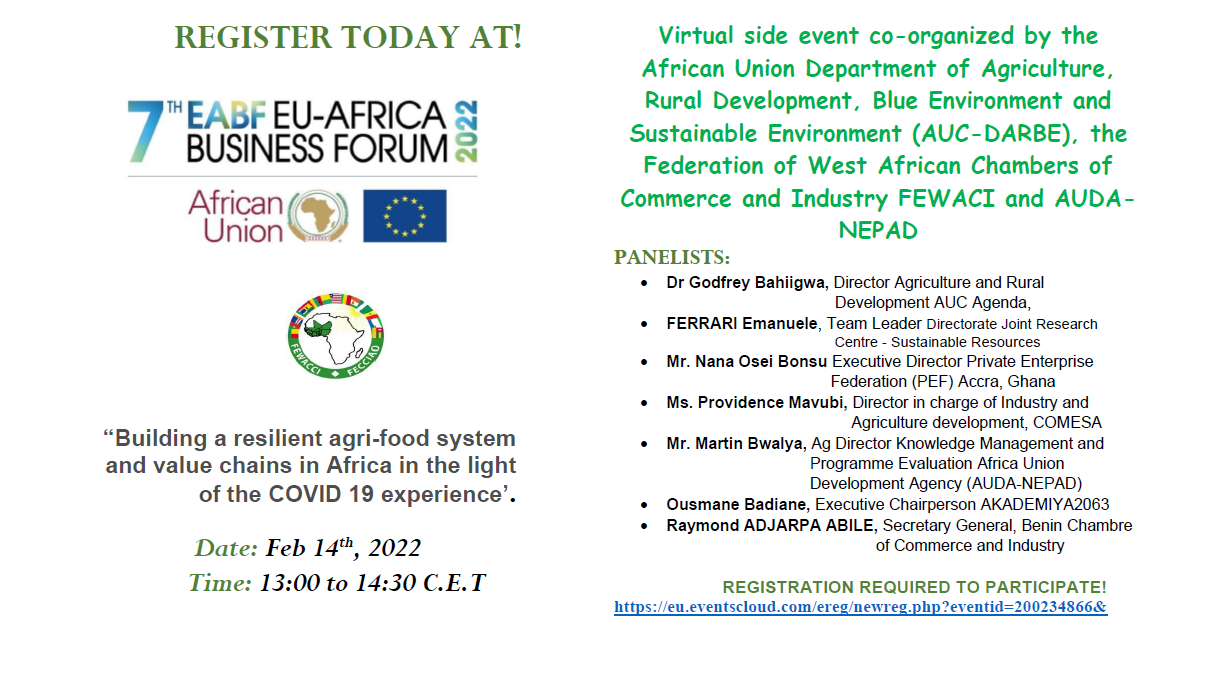
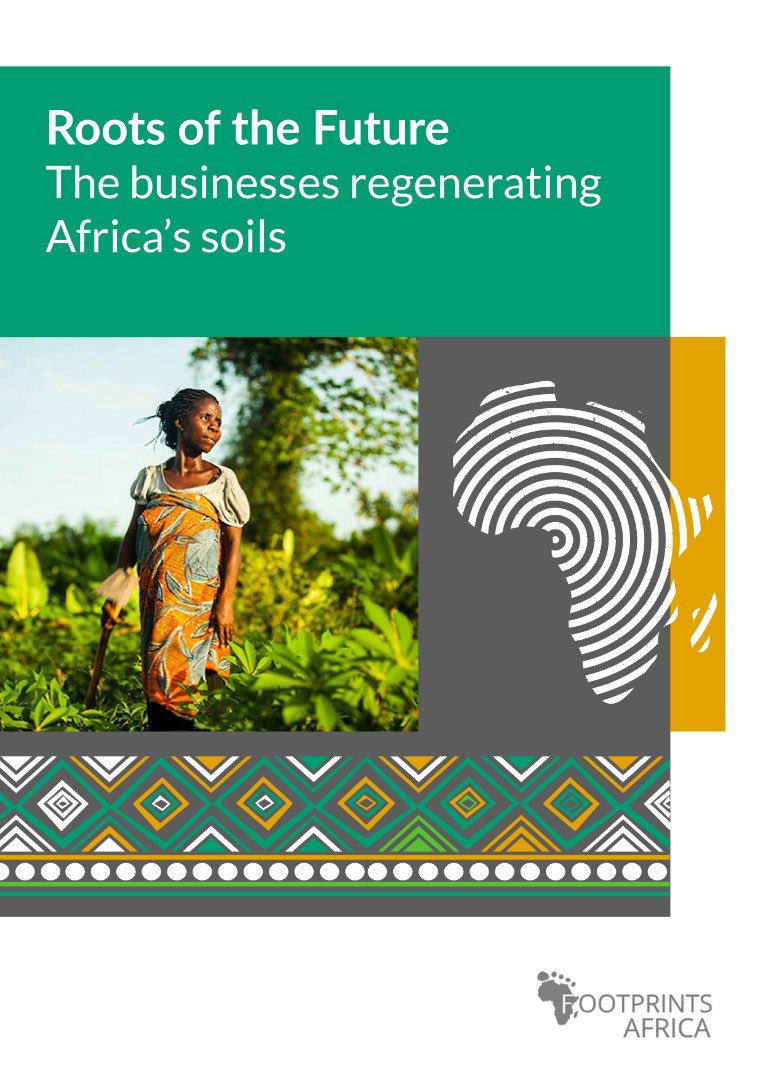
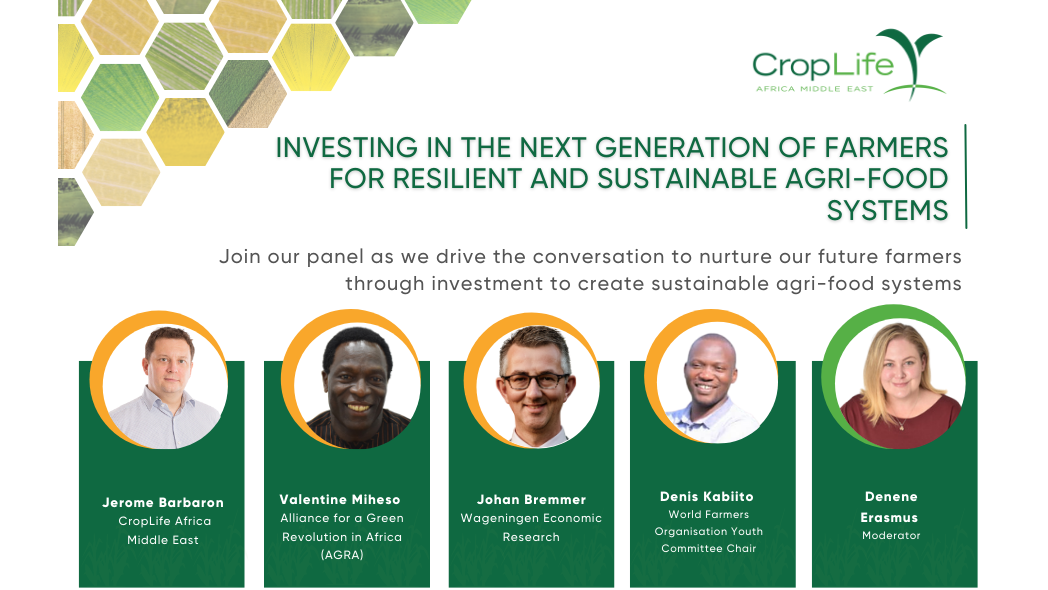
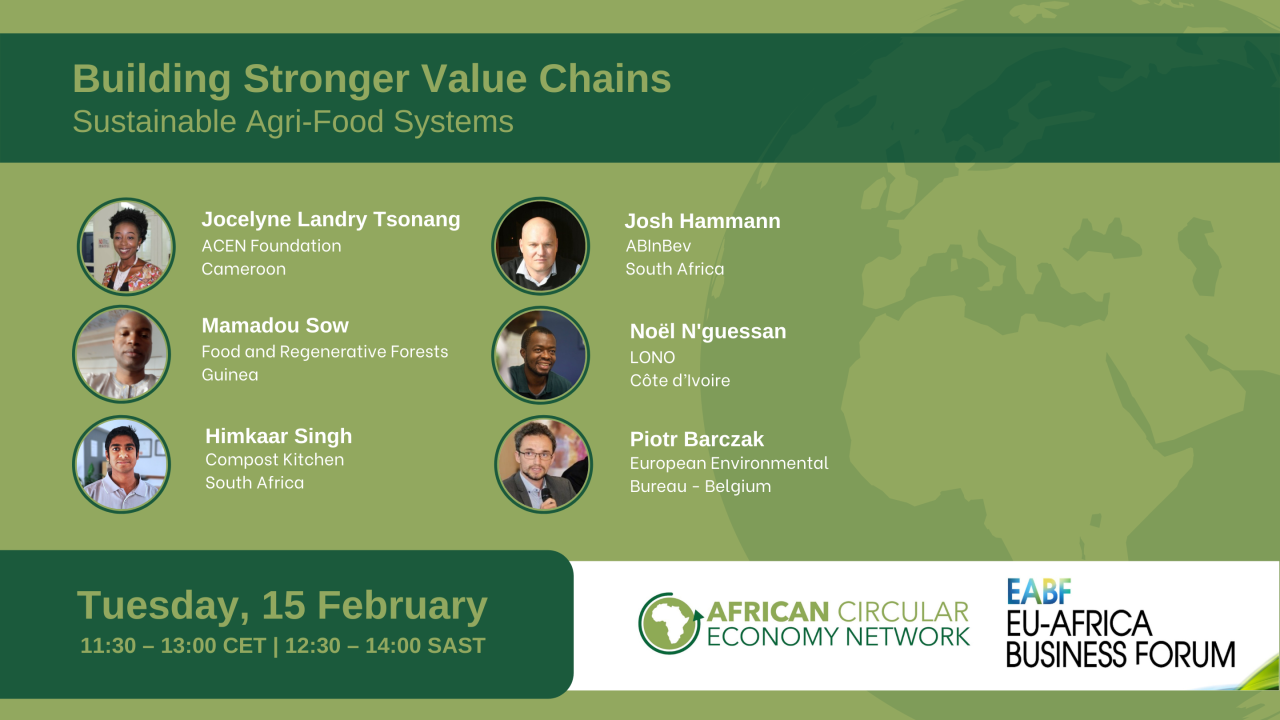
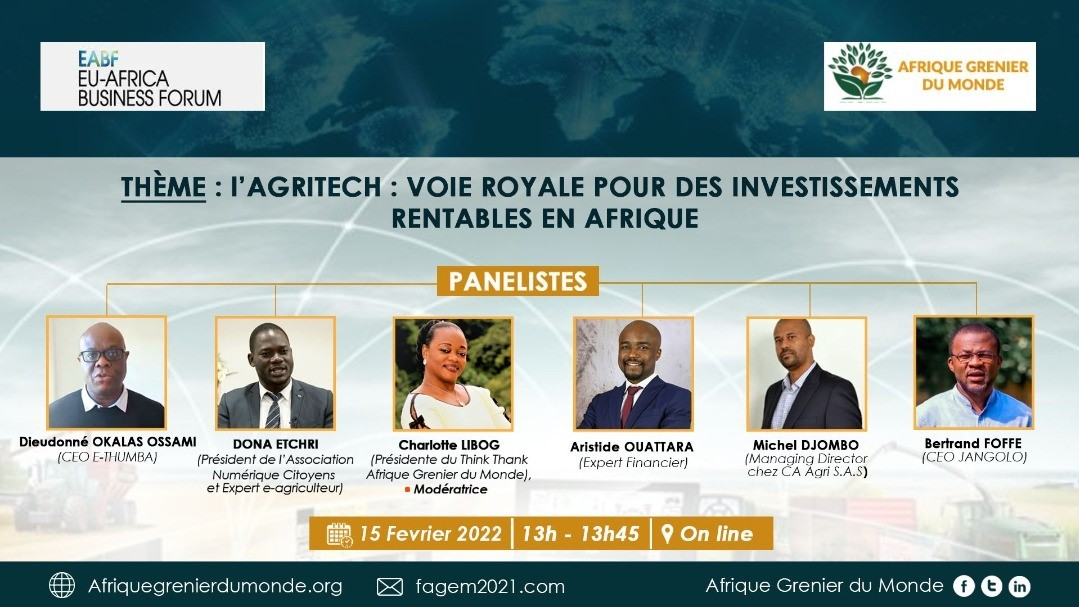





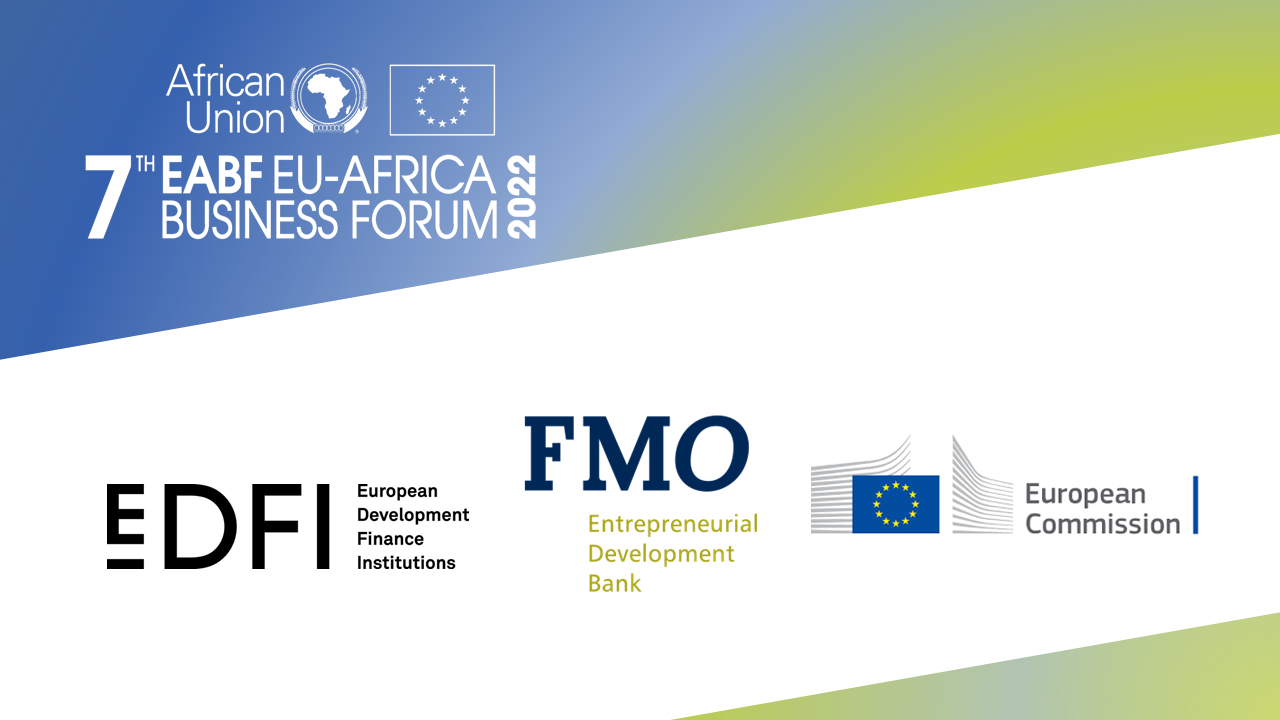
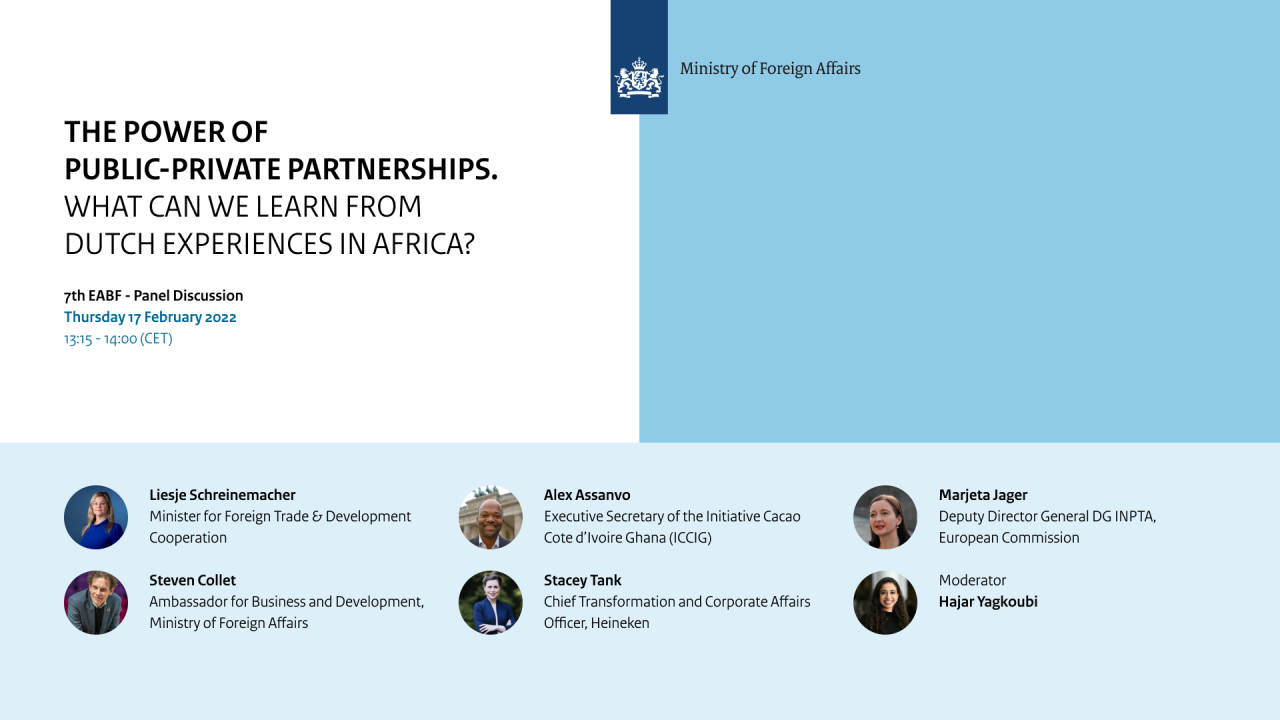
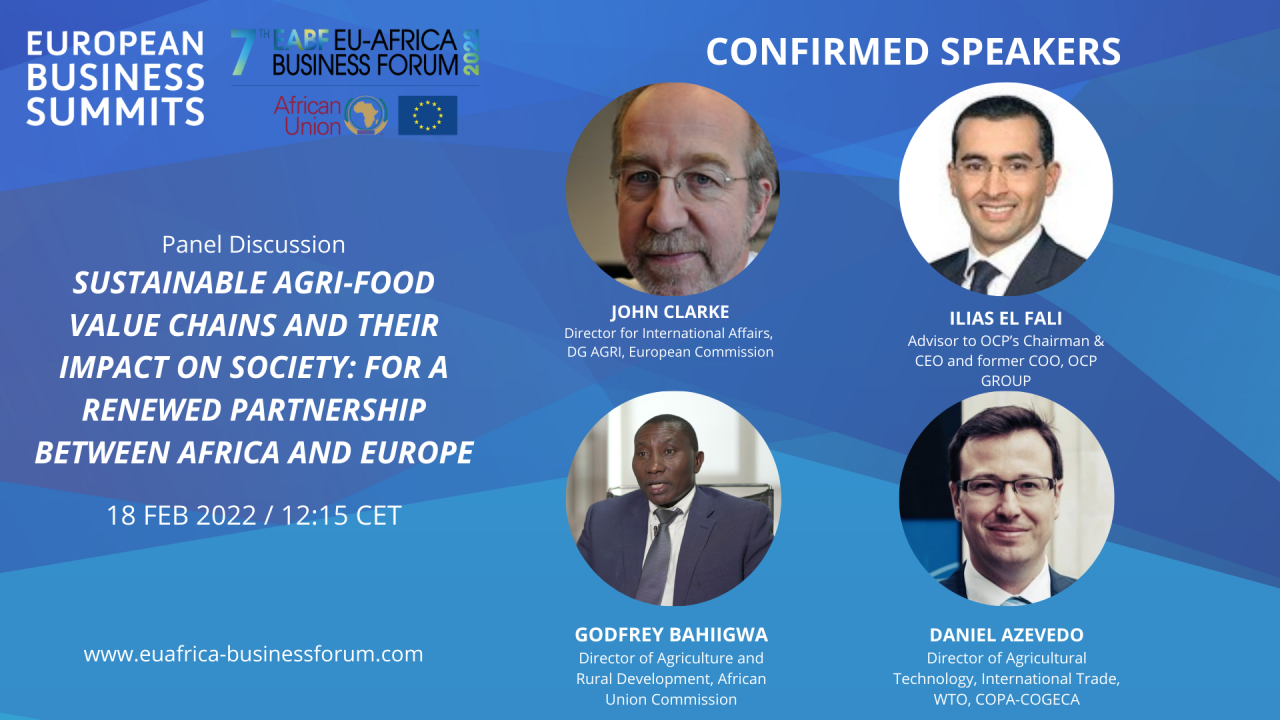
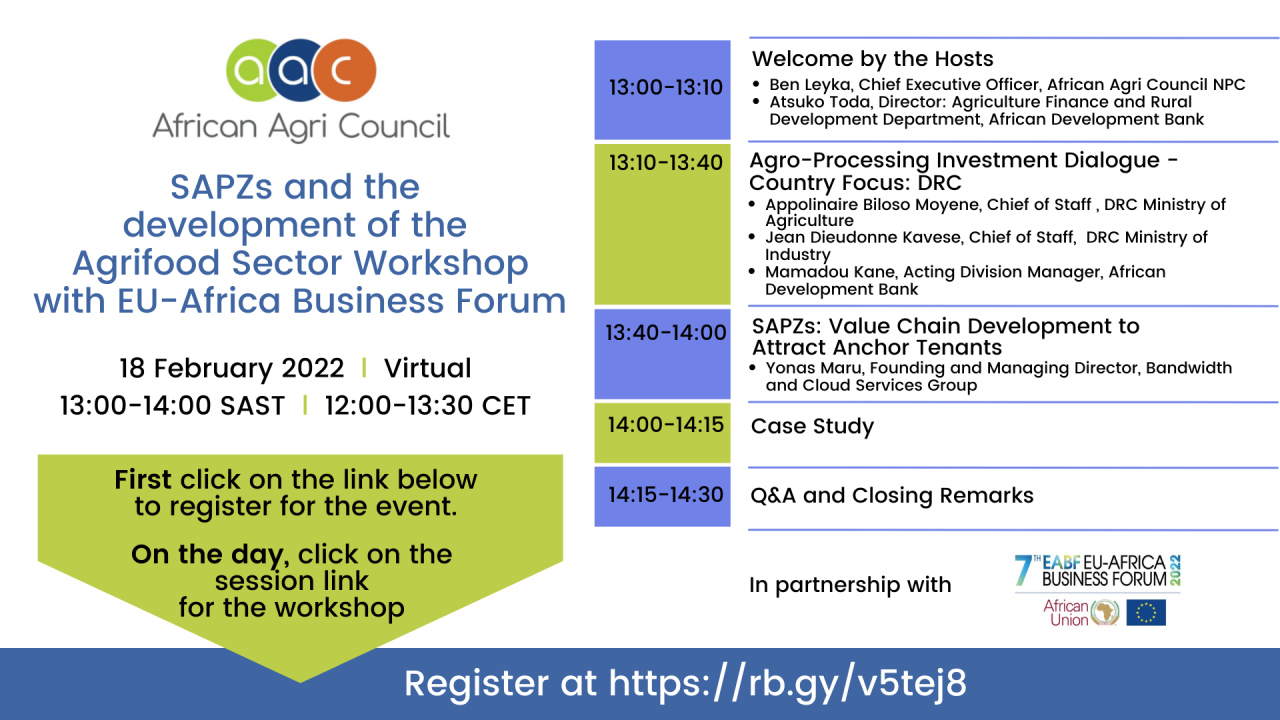
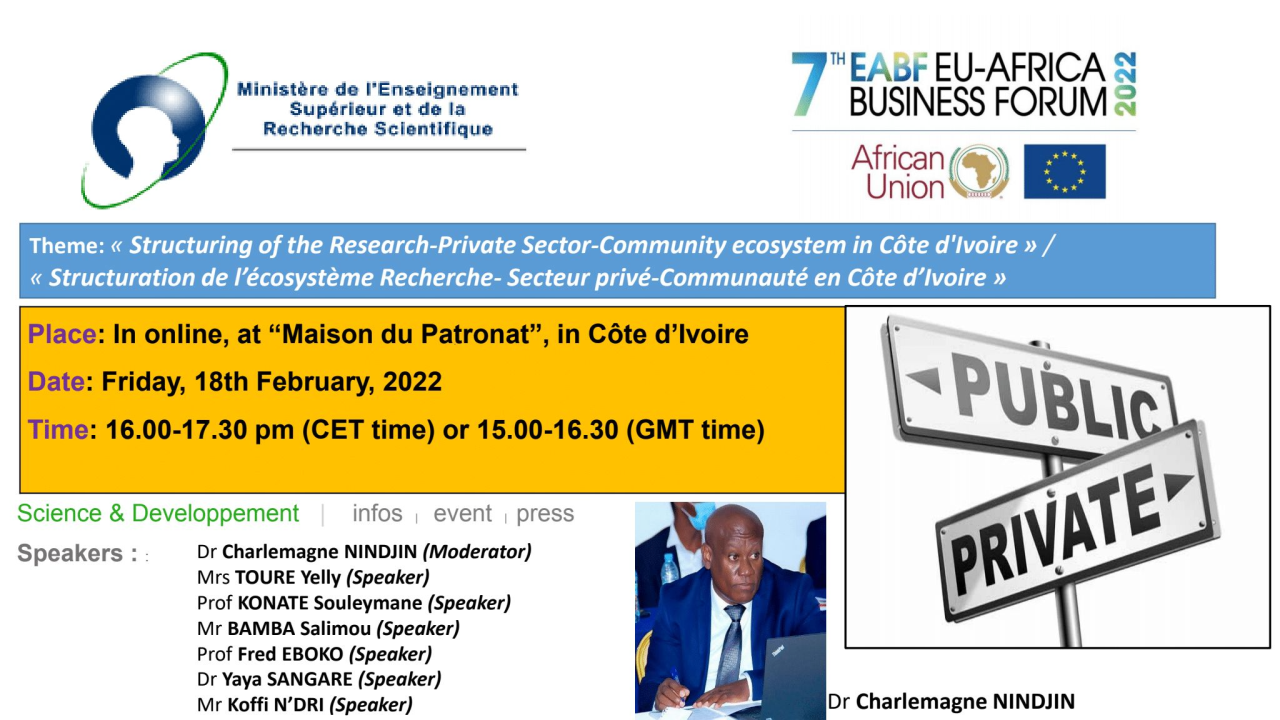
No comments:
Post a Comment